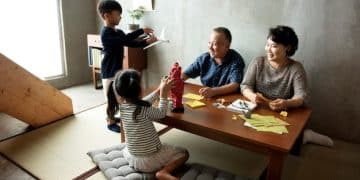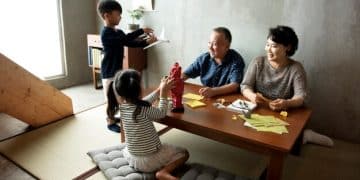Korean Language Camps for American Children: A Worthwhile Investment?

Korean language camps for American children are gaining popularity, offering immersive experiences that enhance language skills and cultural understanding, but parents should weigh the costs, benefits, and their child’s interests to determine if it’s a worthwhile investment.
The allure of learning a new language, especially one as culturally rich as Korean, has captured the attention of many American families. The Growing Trend of Korean Language Camps for American Children: Is It Worth the Investment? That’s the question parents are asking as these immersive experiences become more prevalent.
Exploring the Rise of Korean Language Camps in the US
Korean language camps are increasingly becoming a popular option for American parents who want their children to learn Korean. These camps provide an immersive environment where children can learn the language and culture through various activities.
But why are these camps gaining traction, and what makes them a potentially valuable experience for young learners?
The Hallyu Wave and Cultural Interest
The “Hallyu” wave, or Korean Wave, has significantly impacted global culture, including the US. K-pop, K-dramas, and Korean cuisine have become mainstream, sparking interest in the Korean language and culture.
- Increased exposure to Korean entertainment creates a natural curiosity.
- Parents see the value in their children learning a language tied to a vibrant and growing culture.
- Many children express genuine interest in Korean culture, motivating them to learn the language.
Benefits of Early Language Learning
Studies have shown that children who learn a second language at a young age often experience cognitive benefits such as improved problem-solving skills and enhanced memory. Learning Korean, in particular, can provide unique advantages.

- Early language acquisition can lead to better pronunciation and fluency.
- Learning Korean can open doors to future academic and professional opportunities.
- It promotes cultural sensitivity and understanding among young learners.
In conclusion, the rise of Korean language camps reflects a growing cultural interest and the recognized benefits of early language learning. These camps cater to a desire to engage with Korean culture in a fun and educational way.
What Happens at a Korean Language Camp?
Understanding what goes on inside a Korean language camp is crucial for parents considering this option. These camps offer a diverse range of activities designed to immerse children in the Korean language and culture.
So, what exactly can children expect when they attend a Korean language camp?
Language Classes and Activities
The core of any language camp is, of course, language instruction. Camps typically offer classes tailored to different proficiency levels, from beginners to more advanced learners.
Language classes often incorporate:
- Interactive lessons that focus on speaking, listening, reading, and writing.
- Fun activities such as games, songs, and role-playing to make learning engaging.
- Small class sizes to ensure personalized attention for each child.
Cultural Immersion Experiences
Beyond language classes, cultural immersion is a key component. This involves experiencing various aspects of Korean culture firsthand.

Cultural activities may include:
- Trying on traditional Korean clothing (Hanbok).
- Learning traditional Korean dances and songs.
- Participating in Korean arts and crafts, such as calligraphy and painting.
Daily Life and Social Interactions
The daily routine at a Korean language camp is designed to encourage constant interaction and language practice. Children live, eat, and play together, fostering a sense of community.
This immersive environment enables them to:
- Practice speaking Korean with native speakers and fellow learners.
- Make new friends who share their interest in Korean culture.
- Develop independence and adaptability by navigating a new environment.
In conclusion, Korean language camps offer a blend of language instruction, cultural immersion, and social interaction, creating a holistic learning experience. This well-rounded approach helps children develop language skills and cultural understanding while having fun.
The Cost Factor: Is It Affordable?
One of the primary considerations for parents is the cost of sending their children to a Korean language camp. Understanding the financial implications is crucial in determining whether it’s a feasible investment.
Let’s delve into the various expenses associated with these camps and explore potential ways to make them more affordable.
Tuition Fees and Additional Expenses
Tuition fees vary widely depending on several factors, including the camp’s duration, location, and the range of activities offered. Additional expenses can also add up quickly.
Important factors related to the fees:
- Accommodation and meals are often included in the tuition fee.
- Travel expenses, such as airfare and transportation to and from the camp, can be significant.
- Additional costs may include textbooks, supplies, and optional excursions.
Comparing Costs with Other Language Programs
Comparing the cost of Korean language camps with other language programs can help parents make an informed decision. Alternatives include private tutoring, online courses, and local language schools.
Comparison of the alternatives:
- Private tutoring can be more flexible but may lack the immersive experience of a camp.
- Online courses are often more affordable but require self-discipline and may not offer the same level of interaction.
- Local language schools provide structured learning but may not offer intensive, immersive programs.
Scholarships and Financial Aid
Fortunately, there are scholarships and financial aid options available to help families offset the cost of Korean language camps. Researching and applying for these opportunities can make the experience more accessible.
These opportunities include:
- Some camps offer their own scholarships based on merit or financial need.
- Organizations dedicated to promoting Korean culture may provide grants or scholarships.
- Parents can also explore crowdfunding or fundraising to gather financial support.
In conclusion, while the cost of Korean language camps can be significant, understanding the various expenses and exploring financial aid options can make them more accessible. Comparing costs with other language programs can also help parents determine the best value for their investment.
Assessing Your Child’s Interest and Readiness
Before enrolling your child in a Korean language camp, assessing their interest and readiness is essential. Ensuring that your child is genuinely interested and prepared for the experience can significantly impact their enjoyment and success.
How can parents gauge their child’s enthusiasm and readiness for such an immersive program?
Signs of Genuine Interest
Identifying signs of genuine interest is the first step. This involves observing your child’s behavior and paying attention to their expressed preferences.
Look for these signs of interest:
- Enthusiasm for Korean culture, such as K-pop, K-dramas, or Korean cuisine.
- Willingness to learn basic Korean phrases or words.
- Curiosity about Korean traditions and customs.
Evaluating Language Learning Aptitude
Evaluating your child’s aptitude for language learning can provide insights into how well they might adapt to a Korean language camp. Some children naturally pick up languages more easily than others.
Consider these factors:
- Past experiences learning other languages, whether in school or through personal interest.
- Ability to mimic and pronounce new sounds and words.
- General interest in communication and cultural exchange.
Preparing Your Child for the Experience
Preparing your child for the camp experience can ease their transition and help them make the most of the opportunity. This involves discussing what to expect and addressing any concerns they may have.
Steps to prepare your child:
- Talk about the camp’s activities, daily routine, and cultural immersion experiences.
- Encourage them to learn some basic Korean phrases before attending.
- Address any anxieties they may have about being away from home or trying new things.
In conclusion, assessing your child’s interest and readiness is crucial for ensuring a positive experience at a Korean language camp. By identifying signs of genuine interest, evaluating language learning aptitude, and preparing your child for the experience, parents can make an informed decision and set their child up for success.
The Cultural and Social Benefits Beyond Language
While Korean language camps primarily focus on language acquisition, they also offer significant cultural and social benefits that extend beyond linguistic proficiency. These benefits can have a lasting impact on a child’s development and worldview.
Let’s explore some of the key cultural and social advantages of attending these camps.
Developing Cultural Sensitivity
Exposure to a new culture fosters cultural sensitivity, which is the ability to understand and appreciate the values, beliefs, and customs of people from different backgrounds. This is particularly valuable in today’s interconnected world.
This happens because:
- Learning about Korean history and traditions broadens a child’s perspective.
- Interacting with native speakers and fellow learners from diverse backgrounds promotes empathy.
- Experiencing cultural practices firsthand, such as traditional dances and arts, enhances understanding.
Expanding Social Skills
Language camps provide opportunities for children to develop essential social skills. Living, learning, and playing together in an immersive environment fosters teamwork, communication, and conflict-resolution abilities.
Social skills are developed through:
- Collaborative projects and activities that encourage teamwork.
- Opportunities to communicate and interact with peers and instructors.
- Experiences that require adaptability and problem-solving in social situations.
Building Confidence and Independence
Attending a language camp can boost a child’s confidence and independence. Navigating a new environment, trying new things, and overcoming challenges contribute to a sense of accomplishment and self-reliance.
Confidence and independence are built through:
- Successfully learning new language skills and cultural practices.
- Making new friends and building connections with peers and mentors.
- Stepping outside their comfort zone and embracing new experiences.
In conclusion, Korean language camps offer a multitude of cultural and social benefits that go beyond language acquisition. These experiences foster cultural sensitivity, expand social skills, and build confidence and independence, contributing to a well-rounded and globally aware individual.
Making the Decision: Is It the Right Choice for Your Family?
Deciding whether to enroll your child in a Korean language camp is a significant decision that requires careful consideration. There are several factors to weigh before determining if it’s the right choice for your family.
Let’s summarize the key considerations to help you make an informed decision.
Reviewing Your Child’s Interest and Goals
Start by revisiting your child’s interest and goals. Is their enthusiasm for Korean culture genuine and sustained? Do they have specific goals for learning the language, such as watching K-dramas without subtitles or communicating with Korean-speaking relatives?
Ensure that:
- Your child expresses excitement about attending the camp and learning Korean.
- Their goals align with the camp’s objectives and offerings.
- They are willing to commit time and effort to learning the language.
Considering the Financial Implications
Evaluate the financial implications of sending your child to a Korean language camp. Can you afford the tuition fees, travel expenses, and additional costs? Are there scholarship or financial aid options available?
Be sure to factor in:
- The total cost of the camp, including all associated expenses.
- Your family’s budget and financial priorities.
- The potential return on investment in terms of your child’s language skills and cultural understanding.
Evaluating the Camp’s Reputation and Offerings
Research and evaluate the camp’s reputation and offerings. Does the camp have a good track record? Are the instructors qualified and experienced? Does the curriculum align with your child’s learning style and goals?
Look for:
- Positive reviews and testimonials from previous attendees.
- Accreditations or affiliations with reputable organizations.
- A well-structured curriculum that balances language instruction with cultural immersion.
In conclusion, deciding whether to enroll your child in a Korean language camp requires careful consideration of their interests, financial implications, and the camp’s reputation. By weighing these factors, you can make an informed decision that aligns with your family’s goals and values. The Growing Trend of Korean Language Camps for American Children: Is It Worth the Investment? Ultimately, the answer depends on your unique circumstances and priorities.
| Key Aspect | Brief Description |
|---|---|
| 🇰🇷 Cultural Immersion | Exposure to Korean traditions and practices. |
| 🗣️ Language Skills | Learning Korean through immersive classes and activities. |
| 💰 Cost Factors | Tuition, travel, and additional expenses. |
| 🤝 Social Benefits | Developing social skills and building confidence. |
Frequently Asked Questions (FAQ)
▼
Most Korean language camps cater to children and teenagers aged 8-18. Some camps may have specific age groups, so check the camp’s website for details.
▼
No, many camps offer programs for various skill levels. You can start as a complete beginner, and the camp will help you learn the language from scratch.
▼
Korean language camps vary in length, with options ranging from one week to several weeks, depending on the program and the availability of the camp.
▼
Yes, most Korean language camps include cultural activities like cooking and tasting Korean dishes. This can be a fun and immersive way to learn about Korean culture.
▼
Many Korean language camps offer field trips to local Korean cultural sites or events. Check the camp’s itinerary for specific details on excursions.
Conclusion
In conclusion, Korean language camps for American children offer a unique blend of language learning, cultural immersion, and social development. By carefully considering your child’s interests, financial implications, and the camp’s offerings, you can determine if this immersive experience is a worthwhile investment for your family, enriching your child’s life with new skills and perspectives.





